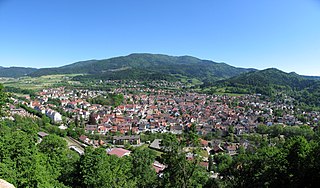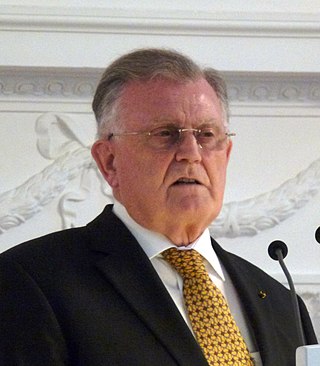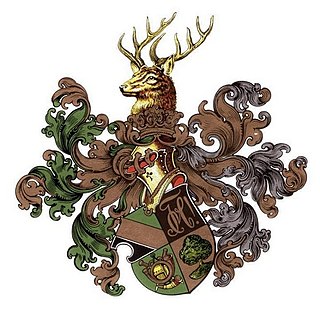Related Research Articles

Constantin Fehrenbach, sometimes erroneously, Konstantin Fehrenbach, was a German Catholic politician who was one of the major leaders of the Centre Party or Zentrum. He served as the president of the Reichstag in 1918, and then as the president of the Weimar National Assembly from 1919 to 1920. In June 1920, Fehrenbach became the chancellor of Germany. He resigned in May 1921 over the issue of war reparation payments to the Allies. Fehrenbach headed the Centre Party's Reichstag fraction from 1923 until his death in 1926.

Waldkirch is a town in Baden-Württemberg, Germany, located 15 kilometers northeast of Freiburg im Breisgau. While the English translation of its name is Forest Church, it is known as the "town of mechanical organs", where fairground organs played on the streets were long manufactured by such well-known firms as Carl Frei, Andreas Ruth and Son, and Wilhelm Bruder and Sons. The largest employers today are SICK AG, which manufactures optical sensors, Faller AG, which prints pharmaceutical packages and inserts, and Mack Rides, which exports amusement park and water park rides worldwide. Cultural events include the Klappe 11 Cinema festival, the Organ Festival and the Peter Feuchtwanger Piano Masterclass.

Karl Wilhelm Friedrich August Leopold Graf von Werder was a Prussian general.

Hans Karl Filbinger was a conservative German politician and a leading member of the centre-right Christian Democratic Union in the 1960s and 1970s, serving as the first chairman of the CDU Baden-Württemberg and vice chairman of the federal CDU. He was Minister President of Baden-Württemberg from 1966 to 1978 and as such also chaired the Bundesrat in 1973/74. He founded the conservative think tank Studienzentrum Weikersheim, which he chaired until 1997.

Gustav Georg Friedrich Bohlen-Halbach since 1871 von Bohlen-Halbach was an American-born German diplomat, court master of ceremonies and minister resident for the Grand Duchy of Baden. His fifth son, Gustav Krupp von Bohlen und Halbach, married Bertha Krupp who served as president of the supervisory board of Krupp from 1908 to 1943.

Staufen im Breisgau is a German town in the Breisgau-Hochschwarzwald district of Baden-Württemberg. It had a population of approximately 8,300 in 2019.

Erwin Teufel is a German politician of the CDU.

Arnold Stadler is a German writer, essayist and translator.

Sedantag was a semi-official memorial holiday in the German Empire celebrated on the second day of September to commemorate the victory in the 1870 Battle of Sedan. After the outbreak of the Franco-Prussian War a few weeks earlier, French emperor Napoleon III and his army were taken prisoner in the fortress of Sedan by Prussian troops, a major step to eventual victory.

The Freiburg–Colmar railway was an international railway that formerly connected Freiburg im Breisgau, in the German state of Baden-Württemberg, with Colmar, in the French department of Haut-Rhin. The line crossed the river Rhine on a bridge between Breisach and Neuf-Brisach. Since that bridge was destroyed in 1945, the line from Freiburg has terminated at Breisach, and this stretch of line is now commonly called the Freiburg–Breisach railway, or the Breisacherbahn. The section from Freiburg to Breisach was completed in 1871 and the remainder in 1878.

The Corps Hubertia Freiburg is a fraternity (Studentenverbindung) in Freiburg, Germany. It was founded on October 29, 1868 and is one of 162 German Student Corps in Europe today. The Corps is a member of the Kösener Senioren-Convents-Verband (KSCV), the oldest federation of classical European fraternities with roots dating back to the 15th century and member fraternities across Austria, Belgium, Germany, Hungary, Latvia and Switzerland.

The Siegesdenkmal in Freiburg im Breisgau is a monument to the German victory in the Franco-Prussian War in 1871. It was erected at the northern edge of the historic center of Freiburg im Breisgau next to the former Karlskaserne (barracks). After World War II it was moved 100m to the west. Today it is located on Europaplatz.

The Whale House is a late Gothic bourgeois house in the old town of Freiburg im Breisgau, Baden-Württemberg, Germany and is under conservation. The building is currently used by the Sparkasse Freiburg-Nördlicher Breisgau bank. It is part of a complex which, in the past, was made up of 17 separate buildings. The front wall of the house opens onto the Franziskanerstraße, whilst the rear is on the Gauchstraße, near Kartoffelmarkt square.

The History of Freiburg im Breisgau can be traced back 900 years. Around 100 years after Freiburg was founded in 1120 by the Zähringer, until their family died out. The unloved Counts of Freiburg followed as the town lords, who then sold it onto the Habsburgers. At the start of the 19th century, the (catholic) Austrian ownership of the town ended, when Napoleon, after having invaded the town, decreed the town and Breisgau to be a part of the Grand Duchy of Baden in 1806. Until 1918, Freiburg belonged to the Grand Duchy, until 1933 to the Weimar Republic and Gau Baden in Nazi Germany. After the Second World War, the town was the state capital of (South) Baden from 1949 until 1952. Today, Freiburg is the fourth-largest city in Baden-Württemberg.

The Abbey of St. Märgen is a former Augustinian canons monastery in St. Märgen in the Black Forest in Germany, which was founded around 1118 under the name Cella Sanctae Mariae. The German form of the name, Maria-Zell, changed over the centuries through Marienzell, Sante Merien and St. Mergen to the present name of the abbey and village, St. Märgen. The Baroque abbey church of St. Mary of the Assumption is today the Roman Catholic parish church of St. Märgen and one of the most important Marian pilgrimage churches in the Archdiocese of Freiburg.

Gudrun Heute-Bluhm is a German municipal politician of the CDU. She is a member of the executive committee of the city council of Lörrach, Baden-Württemberg and a member of the federal executive committee of the CDU Germany.

The Platz der Alten Synagoge is a square in Freiburg, Germany. With a size of 130 square metres, it is the second largest square in the city after Minster Square. The square is named after the old synagogue, which was destroyed during the Kristallnacht in 1938. The synagogue had been built in 1869/1870 to the southwest of today's location of the square.

Nikolas Löbel is a German politician of the Christian Democratic Union (CDU) who served as a member of the Bundestag from the state of Baden-Württemberg from 2017 to 2021. He resigned in March 2021.
Matthias Untermann is a German art historian and medieval archaeologist.
References
- ↑ (in German) Archived (Date missing) at spiegel.de (Error: unknown archive URL), Spiegel Online, 27. August 2010.
- ↑ (in German) Interview Tobias Bringmann in: Stuttgarter Nachrichten vom 25. Juni 2019.
- ↑ (in German) "Tobias Bringmann auf Twitter am 17. Dezember 2021".
- ↑ Ralph Erbar: Rezension: Sachbuch – Ehrensache. In: Frankfurter Allgemeine Zeitung , 12. November 1997.